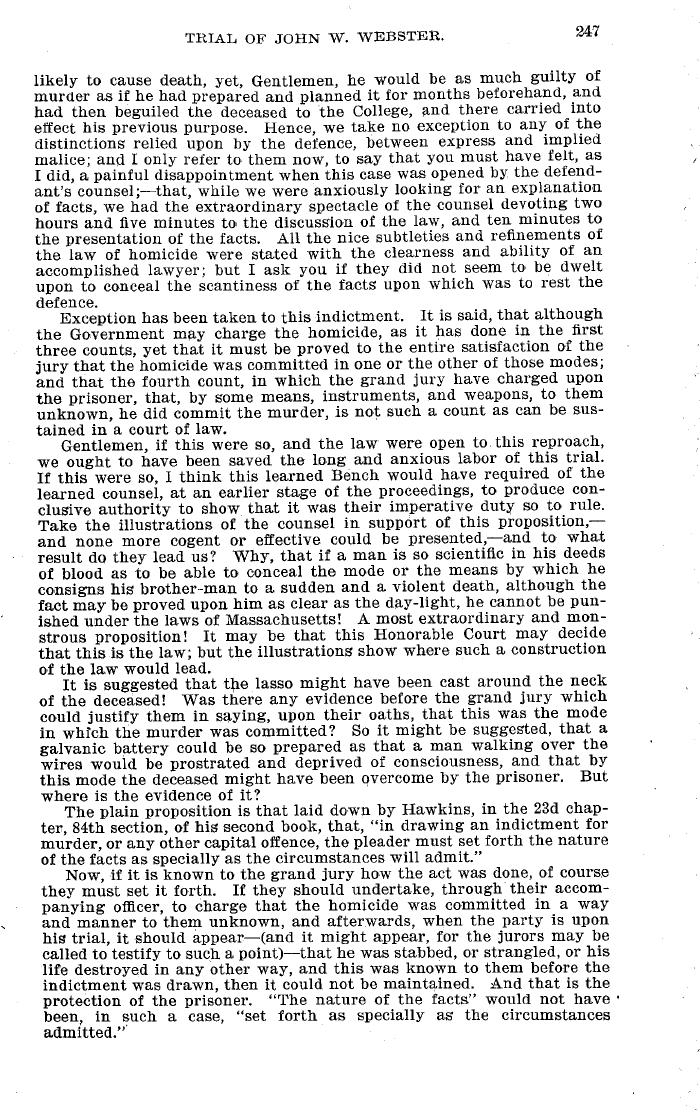|
TRIAL OF JOHN W. WEBSTER. 247
likely to cause death, yet, Gentlemen, he would be as much guilty of
murder as if he had prepared and planned it for months beforehand, and
had then beguiled the deceased to the College, and there carried into
effect his previous purpose. Hence, we take no exception to any of the
distinctions relied upon by the defence, between express and implied
malice; and I only refer to them now, to say that you must have felt, as
I did, a painful disappointment when this case was opened by the defend-
ant's counsel; that, while we were anxiously looking for an explanation
of facts, we had the extraordinary spectacle of the counsel devoting two
hours and five minutes to the discussion of the law, and ten minutes to
the presentation of the facts. All the nice subtleties and refinements of
the law of homicide were stated with the clearness and ability of an
accomplished lawyer; but I ask you if they did not seem to be dwelt
upon to conceal the scantiness of the facts upon which was to rest the
defence.
Exception has been taken to this indictment. It is said, that although
the Government may charge the homicide, as it has done in the first
three counts, yet that it must be proved to the entire satisfaction of the
jury that the homicide was committed in one or the other of those modes;
and that the fourth count, in which the grand jury have charged upon
the prisoner, that, by some means, instruments, and weapons, to them
unknown, he did commit the murder, is not such a count as can be sus-
tained in a court of law.
Gentlemen, if this were so, and the law were open to, this reproach,
we ought to have been saved the long and anxious labor of this trial.
If this were so, I think this learned Bench would have required of the
learned counsel, at an earlier stage of the proceedings, to produce con-
clusive authority to show that it was their imperative duty so to rule.
Take the illustrations of the counsel in support of this proposition,-
and none more cogent or effective could be presented,-and to what
result do they lead us? Why, that if a man is so scientific in his deeds
of blood as to be able to conceal the mode or the means by which he
consigns his brother-man to a sudden and a violent death, although the
fact may be proved upon him as clear as the day-light, he cannot be pun-
ished under the laws of Massachusetts! A most extraordinary and mon-
strous proposition! It may be that this Honorable Court may decide
that this is the law; but the illustrations show where such a construction
of the law would lead.
It is suggested that the lasso might have been cast around the neck
of the deceased! Was there any evidence before the grand jury which
could justify them in saying, upon their oaths, that this was the mode
in whfch the murder was committed? So it might be suggested, that a
galvanic battery could be so prepared as that a man walking over the
wires would be prostrated and deprived of consciousness, and that by
this mode the deceased might have been overcome by the prisoner. But
where is the evidence of it?
The plain proposition is that laid down by Hawkins, in the 23d chap-
ter, 84th section, of his second book, that, "in drawing an indictment for
murder, or any other capital offence, the pleader must set forth the nature
of the facts as specially as the circumstances will admit."
Now, if it is known to the grand jury how the act was done, of course
they must set it forth. If they should undertake, through their accom-
panying officer, to charge that the homicide was committed in a way
and manner to them unknown, and afterwards, when the party is upon
his trial, it should appear-(and it might appear, for the jurors may be
called to testify to such a point)-that he was stabbed, or strangled, or his
life destroyed in any other way, and this was known to them before the
indictment was drawn, then it could not be maintained. And that is the
protection of the prisoner. "The nature of the facts" would not have
been, in such a case, "set forth as specially as the circumstances
admitted."
|

